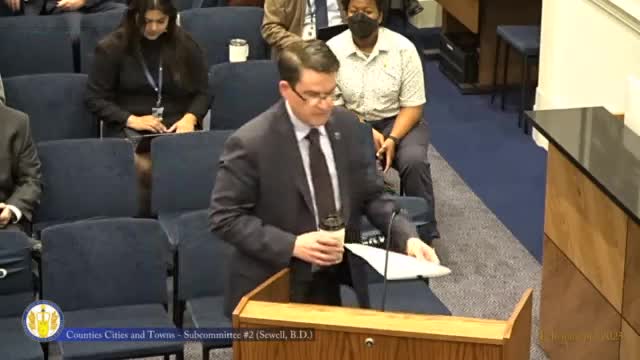Senate panel expands local authority to adopt affordable-dwelling-unit programs; builders raise concerns
This article was created by AI summarizing key points discussed. AI makes mistakes, so for full details and context, please refer to the video of the full meeting. Please report any errors so we can fix them. Report an error »

Senator McPike presented Senate Bill 13-13 on behalf of the patron, proposing to extend to all Virginia localities the authority to adopt affordable-dwelling-unit (ADU) programs that currently exist in a subset of counties and cities.
Supporters, including Fatima Kamara of the Virginia Conservation Network and the Coalition for Smarter Growth, the Virginia Association of Counties and Prince William County planners, said the bill gives local governments a voluntary tool to leverage density and create more affordable units. Joe Lerich of the Virginia Association of Counties said the measure is “a carrot in the toolbox, not a stick.” Tanya Washington, director of planning for Prince William County, said the county seeks placement under a less-prescriptive statutory section (15.2-2304) to gain flexibility compared with its current authority under 15.2-2305 and 15.2-2305.1.
Opposition came from Andrew Clark of the Home Builders Association of Virginia, who argued ADU programs “haven't proven to be effective,” noting that in some jurisdictions they yield relatively few units and consume staff time. Clark told the committee, “They aren't carrots. They are sticks.” He urged consideration of alternative incentives such as tax abatements and state or federal funding programs.
Senator McPike and other supporters said the ADU authority complements limited low-income housing tax credit resources and other programs; they characterized the bill as expanding options for localities rather than mandating a single approach.
The committee voted to report Senate Bill 13-13 (motion by Delegate Simons). The measure reported on a voice roll call of 6 to 2.
The committee record shows multiple local governments and statewide organizations testified in support, and the Home Builders Association offered the principal opposition remarks. The transcript indicates the bill would explicitly allow localities that previously lacked ADU authority to adopt enabling ordinances; localities already operating such programs were noted as examples of existing use.
Looking ahead, the bill proceeds in the legislative process with the committee report and will be available for the next floor or cross-chamber steps.
Supporters, including Fatima Kamara of the Virginia Conservation Network and the Coalition for Smarter Growth, the Virginia Association of Counties and Prince William County planners, said the bill gives local governments a voluntary tool to leverage density and create more affordable units. Joe Lerich of the Virginia Association of Counties said the measure is “a carrot in the toolbox, not a stick.” Tanya Washington, director of planning for Prince William County, said the county seeks placement under a less-prescriptive statutory section (15.2-2304) to gain flexibility compared with its current authority under 15.2-2305 and 15.2-2305.1.
Opposition came from Andrew Clark of the Home Builders Association of Virginia, who argued ADU programs “haven't proven to be effective,” noting that in some jurisdictions they yield relatively few units and consume staff time. Clark told the committee, “They aren't carrots. They are sticks.” He urged consideration of alternative incentives such as tax abatements and state or federal funding programs.
Senator McPike and other supporters said the ADU authority complements limited low-income housing tax credit resources and other programs; they characterized the bill as expanding options for localities rather than mandating a single approach.
The committee voted to report Senate Bill 13-13 (motion by Delegate Simons). The measure reported on a voice roll call of 6 to 2.
The committee record shows multiple local governments and statewide organizations testified in support, and the Home Builders Association offered the principal opposition remarks. The transcript indicates the bill would explicitly allow localities that previously lacked ADU authority to adopt enabling ordinances; localities already operating such programs were noted as examples of existing use.
Looking ahead, the bill proceeds in the legislative process with the committee report and will be available for the next floor or cross-chamber steps.
View full meeting
This article is based on a recent meeting—watch the full video and explore the complete transcript for deeper insights into the discussion.
View full meeting